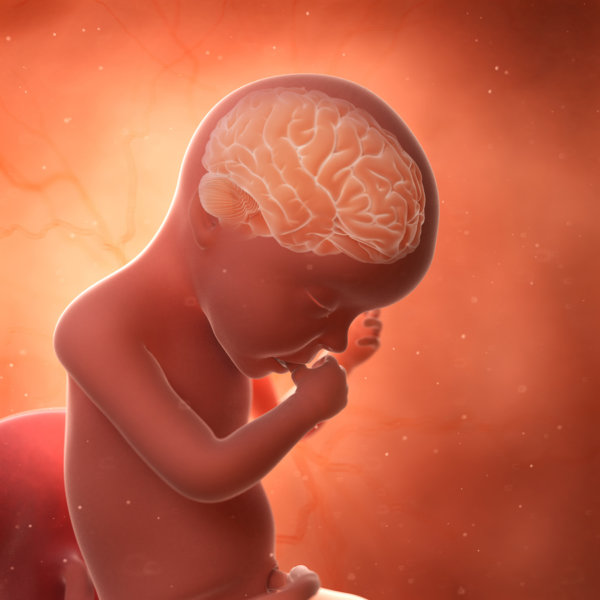
Women who drink alcohol while pregnant can give birth to babies who have a disorder known as fetal alcohol syndrome (FAS). FAS belongs to a category of conditions known as fetal alcohol spectrum disorders (FASDs). These disorders can vary in severity from mild to severe and can lead to many mental and physical congenital abnormalities and impairments.
Types of FASDs include:
- Fetal alcohol syndrome (FAS)
- Partial fetal alcohol syndrome
- Alcohol-related birth defects
- Alcohol-related neurodevelopment disorder (ARND)
- Neurobehavioral disorder associated with prenatal alcohol exposure (ND-PAE)
FAS is the most severe type of FASD. Children with FAS may have problems with hearing, vision, attention span, and the ability to communicate and learn. Much of the damage is long-lasting or permanent.
Fetal Alcohol Syndrome Causes
When a woman who is pregnant drinks alcohol, some of the alcohol passes through the placenta to the unborn fetus. The body of a developing baby cannot process alcohol as efficiently as an adult. Therefore, the alcohol becomes more concentrated in the fetus and can impede oxygen and nutrition from getting to the infant’s vital organs.
Damage is often incurred in the first few weeks of gestation because a woman may not be aware that she is pregnant. The risk increases further if the mother is a heavy drinker and continues to drink throughout the pregnancy.
According to studies, the use of alcohol tends to be the most detrimental during the first trimester of pregnancy. However, the American Academy of Pediatrics (AAP) states that alcohol consumption at any time during pregnancy can also be dangerous for the fetus.
Fetal Alcohol Syndrome Symptoms
Fetal alcohol syndrome can include a wide range of problems, so there are many potential symptoms, which may include the following:
- Small head
- Lack of focus and hyperactivity
- Impaired coordination
- Impaired judgment
- Problems seeing or hearing
- Heart problems
- Kidney defects and abnormalities
- Deformed limbs or fingers
- Mood swings
- Below average weight and height
- Very thin upper lip
- Small, wide-set eyes
- Flat ridge between lip and nose
- Delayed development
- Cognitive difficulties
- Learning disabilities
- Speech and social skill issues
- Uncoordinated movement
Diagnosing Fetal Alcohol Syndrome

A medical exam of the infant may discover a heart murmur or other cardiac concerns. As the child grows, there may be other signs, including the following:
- Slow growth rate
- Abnormal facial features
- Abnormal bone growth
- Vision problems
- Hearing problems
- Slow at learning
- Delayed language development
- Small head
- Impaired coordination
To diagnose FAS, a physician must determine that the infant has abnormal facial features, slower than normal growth, and central nervous system (CNS) problems, which could manifest either physically or behaviorally. They may exhibit hyperactivity, a lack of focus, and learning disabilities.
Alcohol-Related Neurodevelopmental Disorder
Alcohol-related neurodevelopment disorder (ARND) refers to a spectrum of disabilities in neurodevelopment and behavior, self-regulation, and adaptive skills caused by prenatal alcohol exposure. People with ARND do not have the characteristic facial abnormalities of FAS. Instead, they generally have some of the developmental disabilities, including structural CNS dysfunction (e.g., brain damage) and learning and behavioral problems.
Neurobehavioral Disorder Associated with Prenatal Alcohol Exposure
A child with neurobehavioral disorder associated with prenatal alcohol exposure (ND-PAE) will have problems in three areas:
- Thinking and memory, in which the child will have difficulty planning or will soon forget material he or she has already learned
- Behavioral problems, such as tantrums, moodiness (e.g., irritability) and difficulty shifting attention from one task to another
- Trouble with daily living activities, which can include difficulty bathing, dressing, and engaging in playtime with other children
FASD In Adulthood
A fact that remains largely unaddressed is that, as they get older, people with FASD conditions face a higher risk for developing a substance or alcohol use disorder. According to a study from 1996, substance addiction was experienced by 30% of people with FASD. Of the adults with FAE, 53% of males and 70% of females experienced substance abuse issues—more than five times the rate of occurrence than that of the general population.
Long-Term Effects of Alcohol Use During Pregnancy
In the long run, FAS can contribute to a myriad of secondary disorders and problems that tend to make life more challenging for those who suffer it, as well as their caregiver.
The most prevalent secondary conditions include the following:
- Mental health conditions, including ADD, depression, and psychotic disorders
- Academic difficulties due to learning impairments and the inability to work well with others
- Legal issues related to anger control problems and a lack of understanding of social cues
- Alcohol and drug abuse and addiction
Secondary Conditions of FASD During Adulthood

The effects of FASD can be especially challenging to navigate during adulthood when the individual is expected to take responsibility for him or herself. Adults who suffer from effects related to fetal alcohol exposure often need help as they try to find employment, housing, and transportation or manage activities of daily life.
Unfortunately, a significant number of those afflicted will never receive the resources and support they need to be successful. According to a University of Washington study of people with FAS age 6-51, nearly 80% had problems finding and maintaining employment. What’s more, over 60% of those age 12 and over had legal troubles, and 35% had alcohol and drug use disorders.
As people with FAS enter adulthood, both they and their caregivers face additional difficulties. Specialized coaches and counselors may be needed to help these individuals live happy, relatively independent lives.
There are also a number of secondary effects that most people with FAS experience, such as the following:
- Mental health disorders
- Inability to live independently
- Unemployment and homelessness
- Disrupted academic success
- Victimization
- Difficulty raising children
Late Diagnosis and Treatment
Unfortunately, FAS is not always easy to recognize, and it may take years for symptoms to be accurately identified for what they are. Tragically, individuals who are not diagnosed until later in life will not have benefitted from therapy and other resources directed at assisting people with FAS at an early age.
Also, it may be difficult for someone to receive these services once adulthood has been reached, as most of these therapies are designed for children. Finally, at this point, effects may be amplified by alcohol and drug abuse, mental health conditions, or other issues that may cause FAS to manifest differently or exacerbate symptoms.
Preventing Fetal Alcohol Syndrome
A woman can prevent her fetus from developing FAS by not drinking any alcohol during pregnancy. Women who have an alcohol use disorder who would like to get pregnant should seek help from a physician or addiction treatment center. Even for social drinkers, any alcohol consumption during the first trimester of pregnancy can be risky.
Getting Treatment
Persons who suffer from an alcohol dependency should undergo specialized treatment on either a partial-hospitalization or outpatient basis—or a combination of both. At Recovery By The Sea, our treatment programs include behavioral therapy, counseling, group support, aftercare planning, and more.
We employ healthcare professionals who specialize in addiction and provide our clients with the tools, knowledge, and support they need to recover from alcohol addiction and sustain long-term wellness and sobriety.
If you are battling alcoholism, please contact us today. Discover how we help people free themselves from addiction, prevent relapse, and foster healthy and fulfilling lives!